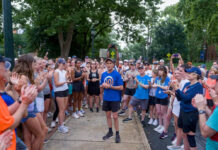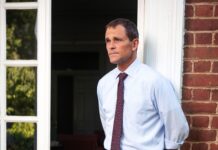
University President Jim Ryan announced Friday that after 10 days of enhanced public health measures, the administration will return to most of its prior policies — including regarding in-person gatherings. Once prohibited completely from congregating, students may now meet among a maximum of six individuals. Gyms and libraries will reopen. In addition, students who live in on-Grounds residences may resume normal activity while observing safety guidelines. Enhanced restrictions appear to have achieved their intended purpose as Ryan reports a “measurable decline” in COVID-19 cases and in the positivity rate.
In an email to the student body, Ryan acknowledged the sacrifices that the University community made during the past 10 days of strict public safety measures.
“We have demonstrated the ability to do the right things to limit the spread of the virus,” Ryan wrote. “If we stay on this path and case counts continue to fall, it will soon be safe to further increase the size of gatherings so that we can all have the most rewarding semester possible together on Grounds.”
While gatherings are now possible, students remain encouraged to stick to limited “pods” and “social bubbles.” University policy defines “pods” as small groups of people who agree to socialize in-person only with one another. “Pod” members also decide to each abide by the same COVID-19 prevention measures — both when the “bubble” is socializing together and in their daily lives. Members of students’ “pods” typically include housemates and family members, but the official policy allows students to select friends who do not live together as well.
In his note, Ryan also explained the positive “trends” in COVID-19 data that led to his administration’s decision to ease restrictions in more detail.
“After 10 days of enhanced public health measures, we are seeing a measurable decline in the number of positive COVID cases and in the positivity rate,” Ryan wrote. “On the first full day of our new public health measures, we registered 229 new cases, our highest total of the year by far. Yesterday we saw just 26 new cases. Similarly, our seven-day average positivity rate has dropped from a high of 4.41 percent positivity to 2.19 percent across our community … These changes are good news, and a clear indication of how seriously members of our community, particularly our students, are taking the enhanced public health measures.”
As with past communications, however, President Ryan urged students not to interpret positive developments in virus containment as a go-ahead to partake in risky activities. Strict restrictions remain in place within dining halls, where students may only eat with one other person. Emphasizing that the disease capitalizes on “small mistakes,” Ryan also acknowledged the University’s inability to ease its restrictions on volunteer activity. The sole exception is for fully-vaccinated students who volunteer as Emergency Medical Technicians or firefighters, who may now resume their activities.
Together with Provost Liz Magill, Chief Operating Officer J.J. Davis, and Executive Vice President for Health Affairs Dr. K. Craig Kent, Ryan warned against complacency.
“We are grateful for your effort and your sacrifices in this important moment for our University,” Ryan wrote. “However, it would be a mistake to interpret [progress] as a sign that we are out of the woods. The only thing preventing another spike in cases and a return to more restrictive measures is our commitment, as a community and as individuals, to remain vigilant and faithfully follow the public health measures we have in place.”
Students continue to engage in weekly prevalence testing. In regard to vaccinations, most students in Charlottesville have a long wait ahead. The Blue Ridge Health Department is currently serving frontline healthcare workers, certain Phase 1B essential workers as defined by the Virginia Department of Health, and individuals age 75 or older. Due to limited supply, the department estimates that it will be March or April before Blue Ridge is able to expand vaccine appointments to accommodate all individuals age 65 or older or individuals between the ages of 16 and 64 with high-risk medical conditions.
Ryan concluded his message with an expression of gratitude.
“Thank you for your patience through this challenging period and for doing your part to get our semester back on track,” he wrote.
For the latest figures on COVID-19 spread at the University of Virginia, click here.
















